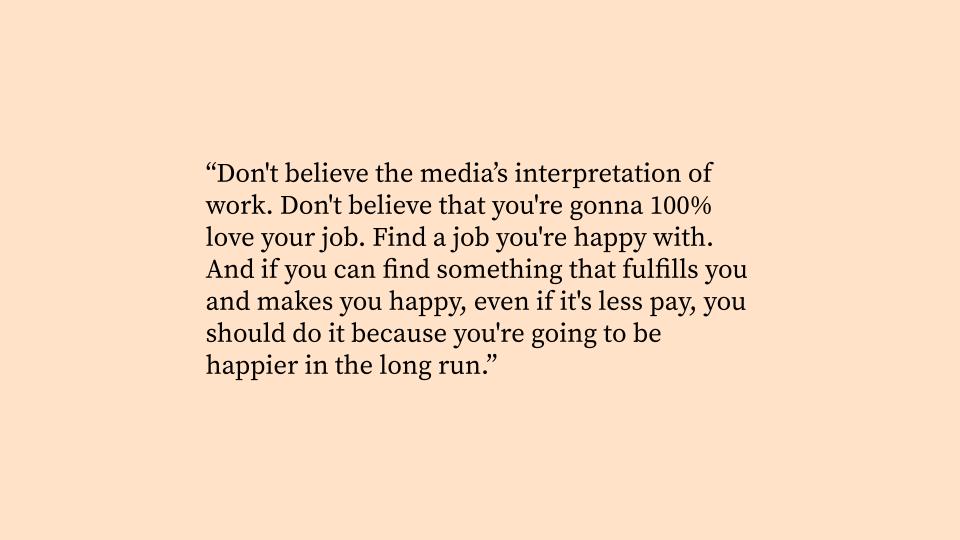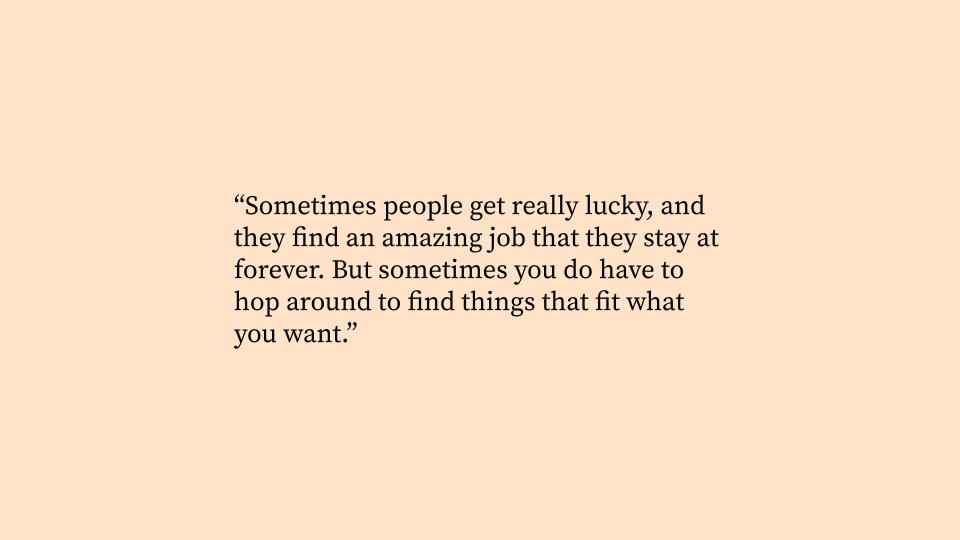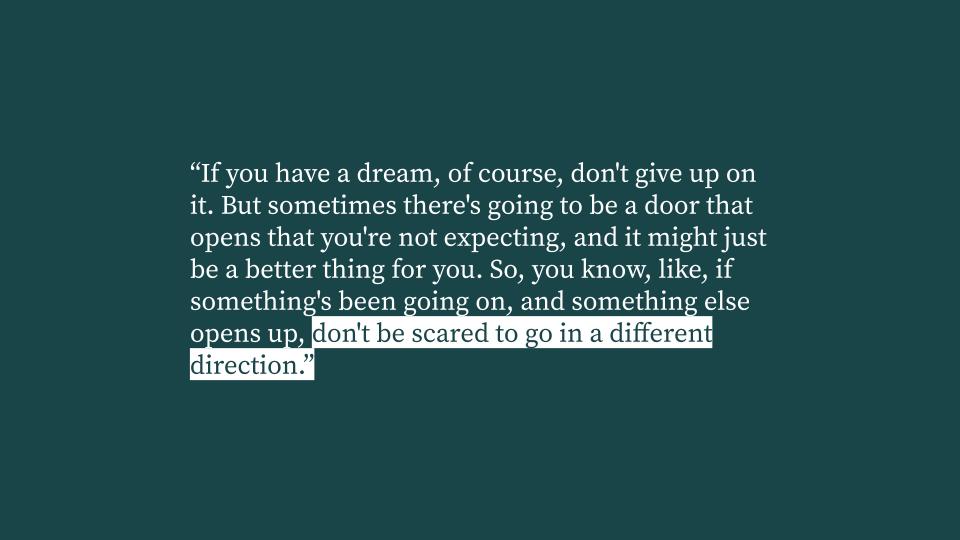So first, in Work, I asked workers about their problems with work to understand what were the aspects of a good job. So now, to start the advice section, I asked prospective workers “What are you worried about when you start work?” to understand what advice would be helpful to prospective workers. There were many answers, but I present a few of them here.
One of the biggest things prospective workers were worried about was they were afraid that they wouldn’t be valued.
As one worker put it:

“I guess I’m nervous that I’ll be at the bottom of the totem pole. I’ll be the youngest employee at my firm, and what worries me is not being able to have a voice. Compared to the other partners, I’m very inexperienced. So because of that, I’m afraid I won’t be able to have the confidence to speak up with my ideas and things like that.”
Prospective workers were also nervous about being adequately compensated.

“I have seen a lot of people saying that the raises that they get by staying with a company over time just do not compete with inflation. So oftentimes, they’re losing money every year, their salaries go down in terms of proportion to the value of the dollar.”
In general, prospective workers felt like they would be taken advantage of, and not have a lot of agency to speak up about it.
As one worker put it:
“I would say that I’m worried I’ll be taken advantage of by the company that I’m working for, and not be paid for the work that I’m doing, or not being compensated enough. And also, it feels like as an employee, you are not in a position of power when the company is the one providing employment to you, providing money and providing benefits. And so if you are to speak up about not having a good work life balance, or being overworked or anything like that, then they don’t really have much incentive to fix that for you.”
Workers were also worried that they would be unprepared to work a job and that their schooling didn’t adequately prepare them for the job search.
When asked, do you feel well prepared for the job search, six out of eight students said no. This brings up the question of why are students not prepared for the job search? Is it a lack of job preparation coursework, exposure to different options, or general dialogue around work and what to expect?
In the interviews held, I find that it’s a bit of all three. As seen in the first section, people didn’t feel very well prepared from school. Even though higher education is advertised as career preparation, oftentimes students felt led astray or under informed in regards to what actual work was going to be like. (Note: However, on average, business majors felt a lot more prepared for work)
One interviewee put it:
“I wish that school better informed me about how real it actually was, like the actual requirements to get and preform a job. No one told us, realistically, you can do X if you pursue A, B, and C, and these are the steps you need to take to actually be doing X. They just said, yeah, this is what you’re learning. I’m took classes on designing a medical device when jobs that allow you to do that all require a PhD.”
Prospective workers also felt like there was no realistic dialogue around work and what work was actually going to be like, in the media or with their peers/families. It seemed like there were so many different beliefs and ideologies behind work that stunted clear experiences and advice. We discussed some of those in 3: what are the beliefs, cultures and pressures that impact how we see work?.
So now, I asked all interviewees one question:
What do you wish you had known before starting work?
They offer their advice to you here. I encourage you to look through these responses carefully, whether you’ve had many jobs or are about to start your first. Their answers are interesting, thoughtful, and hopefully will teach you something new, or prompt you to think about something you haven’t thought of before.
First, for those first time job seekers, if you can, the interviewees advise you to enjoy your time before you start work. Work will always be there, and even though there are so many pressures surrounding you, work will always come. So enjoy the time you have.
“…Take your time, and just enjoy the summer. Enjoy rest, because work will be waiting for you for the rest of your life, or whatever you decide to do next. That’s something that people would keep saying to me as a student, but for some reason, I still felt eager for work. But now reflecting back on it, it is definitely not greener on the other side. So don’t feel so wrapped up with all the job announcement stuff, or the societal pressure. But I know how hard it is. I totally get it.”
“Before you start work, I think you should take a vacation. You’ve been working or at school for the past 15, 20 years of your life. And you are now about to enter the next 40-50 years of your life doing whatever you end up doing. So take some time off and just focus on yourself. Do things you enjoy, because once you start working it’s a lot harder to schedule time off, or it’s a lot harder to schedule time for yourself.”
But when you start work, they also advise you to not over-work, and to set boundaries with your time.
One respondent wished that:
“ [they] knew in advance to prioritize rest in my off hours and not over perform, overcompensate, or think about work too much during my off hours and stuff”
Another recommends setting work boundaries early:
“You need to start setting boundaries early. You can’t be flexible with your free time. If you start taking on more work at first, then you’re going to keep being that guy at work who time and time again, will stay late. And then it becomes almost an expectation. You don’t want to end up in that position.”
Workers also noted that companies will almost overwhelmingly do what’s in their interests, not what is good for you. So you should:
“…always be selfish, because the company will always do what’s in their best interest. They almost never do what’s in your best interest. It sounds bad, but they’re in the business of trying to make the most money and trying to spend the least amount of money. So they will always try to cut corners or make you do the work of one and a half people. And in the end, when you leave, also, they’ll just fill your role with someone else. And so it’s one of those things where you have to be selfish, because they’ll act selfishly too. So I think it’s the most important thing to think about what you want, and what you want to do. The company will always be fine. They won’t go out of business just because one person left.”
“I think you should do your best in your job and really try to be proud of your work. But you don’t need to be working until like eight or 9pm on the weekends. Don’t do it, you know, they’re not doing extra stuff for you. I think work should play a role in your life. It’s important, you should like what you’re doing, it’s definitely like your livelihood, it’s where you know, you make money to support yourself. You should be passionate about it, but don’t be so passionate that it overcomes your hobbies and things you like to do and stuff like that.”

Next, people overwhelmingly advise you to find a job that is right for you, which might not necessarily be the highest paying, the most prestigious, or have the best growth potential. Your happiness at your job impacts your happiness in your life as a whole. They recommend to never give up on your happiness, and think critically about what role work plays within that happiness. If a job isn’t serving your happiness, or is impacting your well-being, don’t be afraid to begin searching for a different position.
This also means that people should be open to new pathways. Some of the most emphasized advice throughout the interviews is to be flexible with your job path and where it takes you.
And finally, people said to make connections. Connections in the workplace mean so much, and you never know when they’ll open new doors (windows, or floodgates!) to you.
“I would say put yourself out there. I think networking is very important. Networking is just huge. It helps to make long lasting connections with people and it’s crazy how people you used to work with can help you later down the line. So just always, try and get yourself out there, don’t be afraid to like, introduce yourself to someone who you think might be too high up for you. Because I feel like at the end of the day, people like to meet other people, and especially in the workplace, it takes you a long way.”
But at the same time, workers emphasized that in workplaces, it’s still your job to be your own biggest proponent.
“I think the biggest thing that I’ve learned is you need to be your biggest proponent. No one’s going to stick up for you. And also, make really good relationships with people who are higher up. Find a mentor who can vouch for you, or guide you, as well, because with office politics, it’s all about who you know.”
“First of all, the people at your work are your co-workers, not your friends. Even if they’re friendly co-workers, at the end of the day, they’re going to do what’s in their best interest and you’re going to have to do what’s in your best interest. The same thing goes for the company. The company is going to do what it’s in the company’s best interest. And you have to look out for yourself.”
Question: What do you wish you had known before starting work?
When answering, consider the things you did/didn’t know before you started work. What helped you, and what didn’t? What changed throughout your work experience that helped you grow?
I wish I had known to set boundaries earlier. I was really eager to please, and that made me some kinda “yes” man. And as I grow in my career, I’m still in that position.





